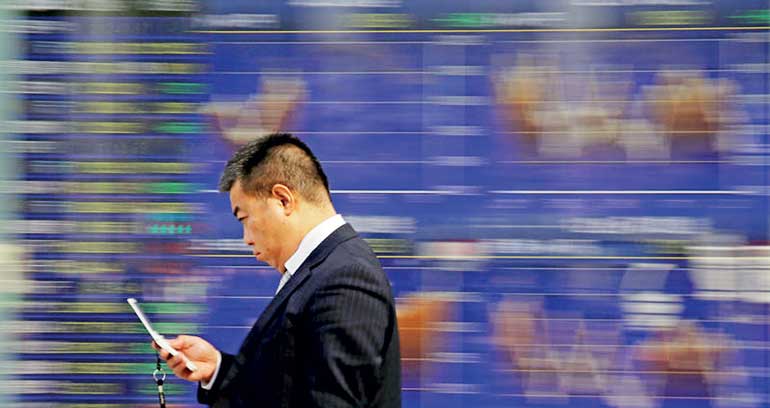Wednesday Feb 25, 2026
Wednesday Feb 25, 2026
Tuesday, 6 March 2018 00:00 - - {{hitsCtrl.values.hits}}

Sydney (Reuters): Asian shares stumbled to near three-week lows yesterday (5 March) amid fears of a global trade war, while the euro was unsteady in currency markets due to worries that an anti-establishment coalition government could emerge from elections in Italy.
Italian voters delivered a hung parliament on 4 March (Sunday), flocking to anti-establishment and far-right parties in record numbers and casting the euro zone’s third-largest economy into a political gridlock that could take months to clear.
After a see-saw start, the common currency eased back to $1.2323 from a two-week high of $1.2365 as the eurosceptic 5-Star Movement saw its support soar to become the largest single party, according to projections based on early vote-counting.
“The messy Italian election result adds a bit to the nervousness to global equity markets at present,” said Sydney-based AMP chief economist Shane Oliver. “The Italian election...does run the risk of making Italy’s public finances worse than they already are with no progress in addressing Italy’s long-term competitiveness problems.”
The euro still found support after Germany’s Social Democrat party decisively backed the renewal of an alliance with Chancellor Angela Merkel’s conservatives, allowing her to form a new government more than five months since the country’s inconclusive election.
The single currency also got a lift from safe-haven flows, as did the yen, with risk sentiment souring on fears of a trade war after US President Donald Trump proposed tariffs on imported steel and aluminium.
The dollar fell for a fourth straight session to trade around 105.49 yen, but was slightly above Friday’s low of 105.23, a level not seen since November 2016.
The dollar index, which measures the greenback against a basket of currencies, was mostly unchanged.
“Nothing’s happened over the weekend to soften concerns about trade wars or retaliatory actions by other countries,” said National Australia Bank Forex Strategy Head Ray Attrill. “There is no rowing back so that gets us to a cautious start.”
Canada and Mexico have threatened retaliation, and the European Union said it would apply 25% tariffs on about $3.5 billion of imports from the United States if Trump carried out his threat.
China said on Sunday it did not want a trade war with the United States but will defend its interests, warning that policies based on “mistaken assumptions” will damage bilateral relations.
SOFT SHARES
Investors fear the current momentum in the global economy could be lost if Trump starts a trade war.
Asian markets were a sea of red with MSCI’s broadest index of Asia-Pacific shares outside Japan falling 0.8% to the lowest since mid-February. It lost more than 2% of its value last week.
Japan’s Nikkei and South Korea’s KOSPI both lost 0.7%, while Chinese shares eased too after starting on a positive note.
US stock futures did not inspire much confidence, with S&P E-Minis down 0.5% and Dow futures off 0.4%.
Frustration with a lack of market access and a lack of fair trade are understandable,” said National Australia Bank Global Research Head Peter Jolly. “If this escalation draws that into focus with some improvement, that would be positive. But retaliatory tit-for-tat measures would weigh against market access, a cost to growth with increases in trade prices, costs, and inflation.”
Investors will focus on a deluge of data this week, culminating in the US non-farm payrolls on Friday. The annual opening of the National People’s Congress in China was another focus for investors. China’s parliament has kept the economy’s growth target at 6.5% for this year.
In commodities, oil prices climbed ahead of a meeting between OPEC and US shale firms in Houston, raising expectations that oil producers would discuss further how to clear a global glut.
Brent crude was up 30 cents at $64.67 a barrel while US light crude added 47 cents to $61.64.
Spot gold climbed 0.3% to $1,325.96.